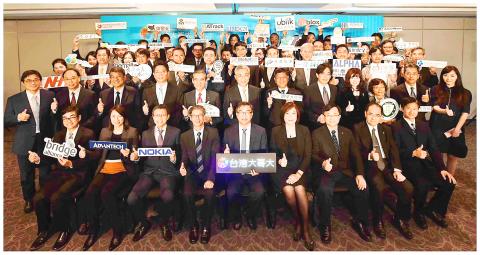Taiwan Mobile Co (台灣大哥大) yesterday said it is teaming up with 50 partners to create the nation’s biggest Internet of Things (IoT) ecosystem, with an ultimate goal of seeking new revenue streams by offering services like data analysis.
The first step in tapping into the market is to expand the scale of IoT devices, although it could make slim profits by offering Internet connections in the initial stage, Taiwan Mobile said.
The company is collaborating with Asian telecom alliance Bridge Alliance, Nokia, light-emitting diodes manufacturers Everlight Electronics Co (億光) and Lite-On Technology Corp (光寶), and “smart” meter module supplier Glory Technology Service Inc (皇輝科技) to explore IoT business opportunities.

Photo: Wang I-hung, Taipei Times
The automative, “smart” home, wearable devices and utilities segments are the fastest-growing areas in the vast IoT market, the nation’s No. 2 telecom operator said.
Taiwan Mobile counts electric carmaker Tesla Inc as one of its IoT customers in the automotive sector.
Benefiting from the fledgling IoT market, Taiwan Mobile expects the number of IoT devices embedded with its SIM cards to more than double to 500,000 units from 200,000 units by the end of this year.
The company has secured 3 million SIM cards for IoT devices from the National Communications Commission.
“All of those SIM cards will be fully used in 2020, given the rapid growth in demand,” Taiwan Mobile president James Cheng (鄭俊卿) said. “The IoT market is expected to take off this year and will continue to be red-hot next year.”
The growth is largely expected to come from the utility and wearable segments over the next three years, Cheng said.
Taiwan Mobile said that in June it plans to bid for the right to install its IoT SIM cards in 200,000 “smart” electric meters.
It is also to supply electronic SIM (eSIM) cards for Apple Inc’s Apple Watch Series 3 in May or June, Taiwan Mobile said.
Taiwan Mobile is in talks with Taiwanese exporters to have their electronics equipped with its SIM cards, which would connect those devices to the Internet overseas using its IoT-bucklescript compiler platform.
The company expects to cut a deal with a local electronics vendor by the end of this year and to facilitate connection for those devices, in addition to completing nationwide deployment of its narrowband IoT network by June.
Local rival Far EasTone Telecommunications Co Ltd (遠傳電信) yesterday said it expects to complete 60 percent of its narrowband IoT network by the end of this month.
It has collaborated with more than 200 partners to offer IoT hardware and software products, the company added.

With this year’s Semicon Taiwan trade show set to kick off on Wednesday, market attention has turned to the mass production of advanced packaging technologies and capacity expansion in Taiwan and the US. With traditional scaling reaching physical limits, heterogeneous integration and packaging technologies have emerged as key solutions. Surging demand for artificial intelligence (AI), high-performance computing (HPC) and high-bandwidth memory (HBM) chips has put technologies such as chip-on-wafer-on-substrate (CoWoS), integrated fan-out (InFO), system on integrated chips (SoIC), 3D IC and fan-out panel-level packaging (FOPLP) at the center of semiconductor innovation, making them a major focus at this year’s trade show, according

DEBUT: The trade show is to feature 17 national pavilions, a new high for the event, including from Canada, Costa Rica, Lithuania, Sweden and Vietnam for the first time The Semicon Taiwan trade show, which opens on Wednesday, is expected to see a new high in the number of exhibitors and visitors from around the world, said its organizer, SEMI, which has described the annual event as the “Olympics of the semiconductor industry.” SEMI, which represents companies in the electronics manufacturing and design supply chain, and touts the annual exhibition as the most influential semiconductor trade show in the world, said more than 1,200 enterprises from 56 countries are to showcase their innovations across more than 4,100 booths, and that the event could attract 100,000 visitors. This year’s event features 17

Germany is to establish its first-ever national pavilion at Semicon Taiwan, which starts tomorrow in Taipei, as the country looks to raise its profile and deepen semiconductor ties with Taiwan as global chip demand accelerates. Martin Mayer, a semiconductor investment expert at Germany Trade & Invest (GTAI), Germany’s international economic promotion agency, said before leaving for Taiwan that the nation is a crucial partner in developing Germany’s semiconductor ecosystem. Germany’s debut at the international semiconductor exhibition in Taipei aims to “show presence” and signal its commitment to semiconductors, while building trust with Taiwanese companies, government and industry associations, he said. “The best outcome

Semiconductor equipment billings in Taiwan are expected to double this year, as manufacturers in the industry are keen to expand production to meet strong global demand for artificial intelligence applications, according to SEMI, which represents companies in the electronics manufacturing and design supply chain. Speaking at a news conference before the opening of Semicon Taiwan trade show tomorrow, SEMI director of industry research and statistics Clark Tseng (曾瑞榆) said semiconductor equipment billings in Taiwan are expected to grow by an annual 100 percent this year, beating an earlier estimate of 70 percent growth. He said that Taiwan received a boost from a